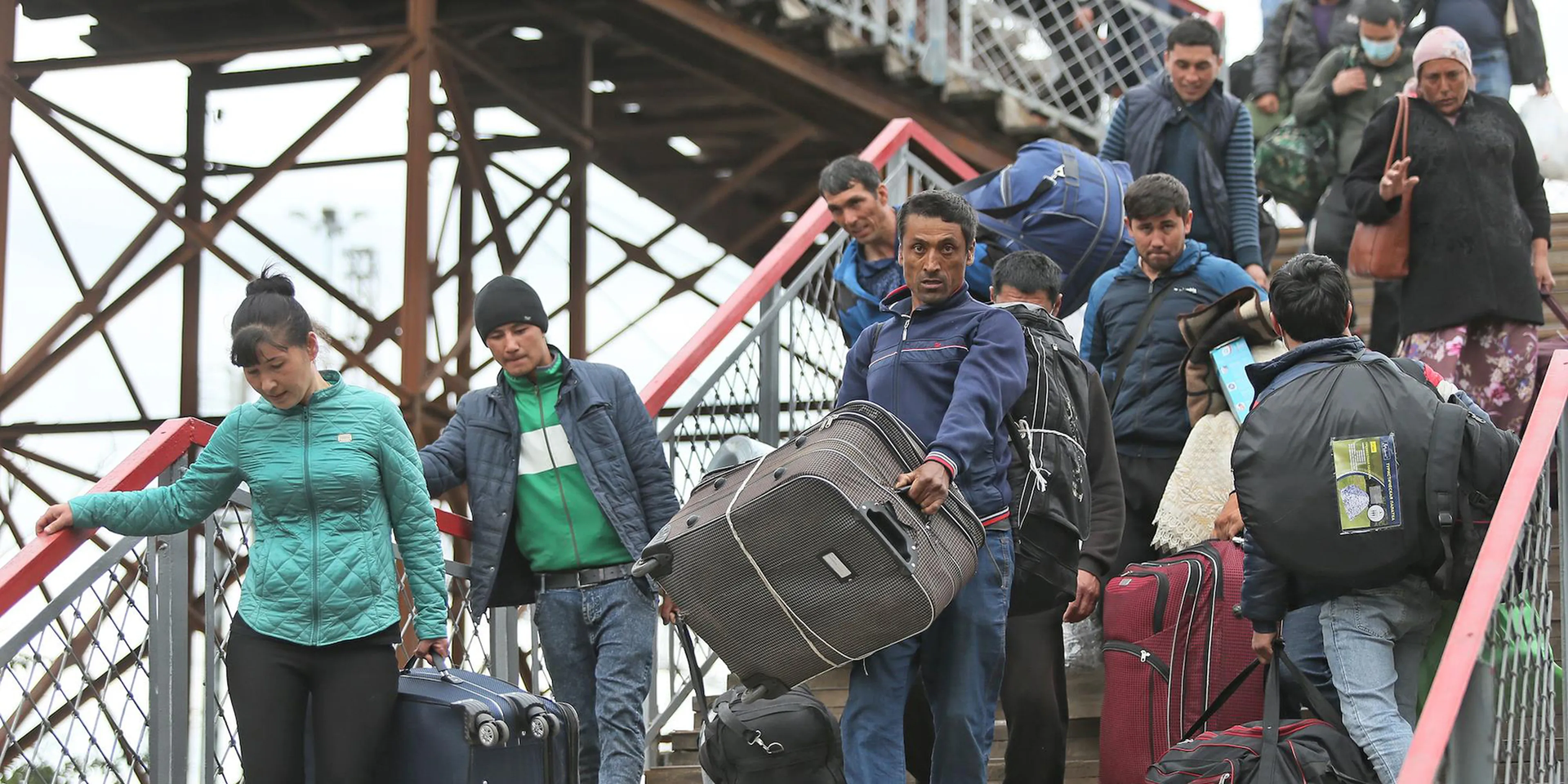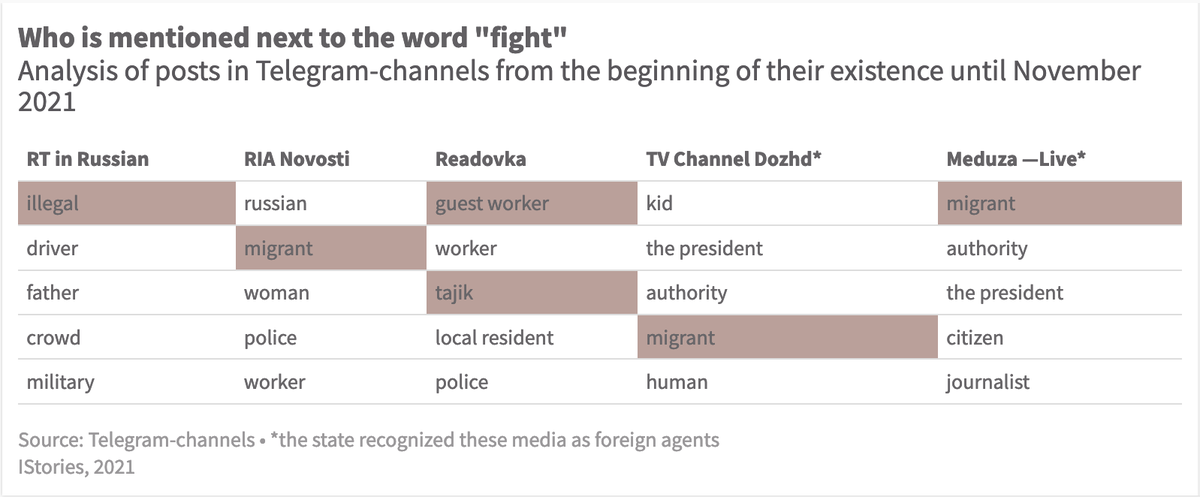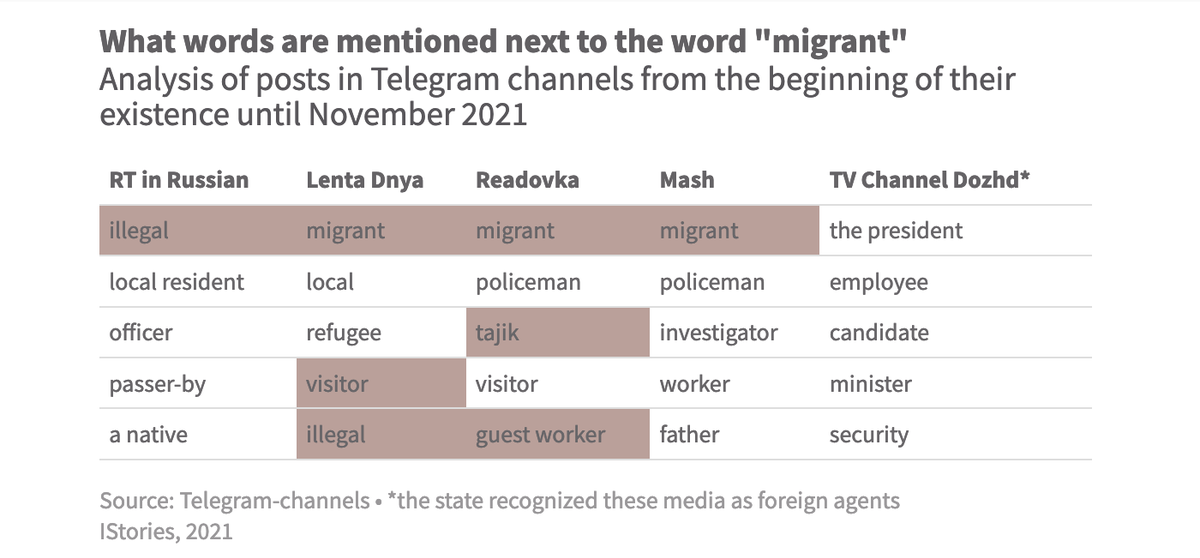How Propagandists Incite Hatred towards Migrants, and the Ministry of Internal Affairs Accuses “Foreign Agents” of Doing So
IStories and Novaya Gazeta analyzed crime statistics, and also studied with the help of neural networks what pro-state media and media, recognized as foreign agents, write about migrants in order to debunk popular myths about non-residents

Lately, the media have often talked about incidents involving migrants: for example, an attack by a non-resident on a man with a child in Novye Vatutinki; the rape and murder of a 67-year-old pensioner in Buzhaninovo; or a mass brawl of migrants in Koptevo (which, as it turned out later, was non-existent). This news was commented on by the Ministry of Internal Affairs. At the end of September, the head of the Main Directorate for Migration Issues of the Ministry of Internal Affairs, Valentina Kazakova, said at a press conference that the image of a migrant in Russia is deliberately criminalized. “Here the role of the media, which is financed from abroad, which are recognized as foreign agents, plays a crucial role. We analyzed crime amongst migrants of these years, compared it with the pre-pandemic situation. I believe that there are fictitious stories in order on the one hand, to criminalize the image of a foreigner, which it does not correspond to, and on the other hand, to generate in the hearts of the indigenous population a dislike for migrants,” said Valentina Kazakova.
IStories, together with Novaya Gazeta, analyzed the popular Telegram channels of bloggers, journalists, state media and independent media, recognized as foreign agents, and found out who writes more about the crimes of migrants and what image of non-residents they form in the mind of the reader. We also tested common myths about migrants with available data.
Who really “generates hostility towards migrants in the souls of the indigenous population”?
To check the statement of Valentina Kazakova, head of the Main Directorate for Migration Affairs of the Ministry of Internal Affairs, Important Stories and Novaya Gazeta analyzed the content of ten popular “pro-state” Telegram channels and those that was recognized as “foreign agents”. All of them are included in the list of the most read in the News and Media category: Mash, Meduza —Live, RIA Novosti, RT in Russian, Lenta Dnya, TV Channel Dozhd, Mediazona, SOLOVIEV, Readovka, Karaulniy.
We downloaded all the messages from these channels from January 2020 to November 2021 and, using the keywords “migrant”, “migration”, “non-resident”, “resident of the near abroad”, selected the records, of which they left only those that deal with the crimes of migrants.
It turned out that foreign media agents - TV Channel Dozhd, Meduza and Mediazona — write little about the crimes of migrants in their news channels. Meduza — a maximum of six messages a month, Dozhd — four, Mediazona — just one.
On the other hand, migrant crime theme is much more popular with the state media and pro-governmental journalists. In the current month alone, the RT in Russian channel published 30 news on the topic, the host of Rossiya 1 Vladimir Solovyov - 24, the Telegram channel Karaulniy - 43. At the same time, the topic of crime amongstst migrants did not appear in the news so often before, the number posts has increased since July this year. Only the Readovka edition has written about this almost every month for the past two years.
The image of a migrant in different Telegram channels
Telegram Channels deliver news about migrants in different ways. In order to understand what image of a migrant is created by the media, we took in general all the posts for the entire existence of the channels and, using a neural network, analyzed which words are used by the authors to describe migrants. The neural network calculated the so-called proximity of words: the higher the proximity coefficient, the more often these words are found in the same context as “migrants” and “non-residents”. As a result, we’ve got an ordered list of words — from more frequent to less. From this list, we have selected several of the most “closest” words, discarding conjunctions, prepositions and pronouns.
The record holder for the number of reports of crimes of migrants in the last month — the Telegram-channel Karaulniy — when mentioning migrants, most often uses the words “illegal”, “detain”, “an incident occurred”, “shooting”, “commit a crime” and “mass brawl”. If we take all the verbs from the contextual environment of the word “non-resident”, then in eighth place after the often used “run away”, “come”, “being a member of”, “leave” and others will be the word “rape”.
An even more negative image of the migrant came from the RT in Russian channel. The media often uses words “detain”, “murder”, “suspect”, “illegal”, “rape”, “attack”. A similar situation is with the word “non-resident”: “arrest”, “accuse”, “violation”, “beat”, “terrorist attack”.
At the same time, if you look at the contextual environment of the same words from media that were proclaimed foreign agents, which the Ministry of Internal Affairs has made responsible for criminalizing the image of a migrant in Russia, you get a completely different picture. For example, in TV Dozhd channel, the closest words to “migrant” are “man”, “citizen”, “rally”, “die”, “conflict”, and to the word “non-resident” — “to detain”, “elections”, “summer”, “Prisoner”, “visa”.
Meduza — Live uses vocabulary similar to RT in Russian and TV Dozhd. Migrants are mentioned together with the words “citizen”, “detain”, “murder”, “illegal”, “person”, and “non-resident” — together with “fight”, “detain”, “journalist”, “murder”, “citizen”.
If we go from the opposite direction and see who will be closer to negative words, for example, to the word “fight”, then amongst the five analyzed Telegram channels at the top we will have a “migrant” or its synonym (the other channels have too few posts about fights for the neural network correctly calculated the proximity coefficient). TV Dozhd writes least of all about migrants in the context of a fight, most of all — RT in Russian and Meduza — Live.

The situation is similar with the word “rape”: amongst four channels, the word “migrant” or its contextual synonym takes the first place in terms of proximity. Lenta of the Day has not only “migrant” in the top five, but also “non-resident”, while Readovka has “Tajik” and “migrant worker”. But TV Dozhd does not have the word “migrant” in the top five at all. (Again, there was not enough material to analyze the remaining channels.)

Due to the fact that media often mention migrants in the context of killings, fights and rapes, it seems that it is migrants who lead in the number of crimes and that they are more dangerous than Russians. Important Stories and Novaya Gazeta analyzed crime data to see if migrants deserve such an assessment.
Myth 1. Migrants are criminals
Annually 10-15 million foreigners are registered in Russia, 80 % of whom are citizens of the CIS countries. As the data of the Prosecutor General's Office show, in general they are about twice as safe as Russians: out of a thousand migrants two or three people commit crimes, and out of a thousand Russians about six. In September 2021, the crime rate amongst immigrants from the CIS countries increased slightly, but still remains below Russian one.
For a Russian, another Russian is indeed more dangerous than a migrant, explains Kirill Titayev, a leading researcher at the Institute for Law Enforcement at the European University. According to him, migrants are more afraid of law enforcement agencies — as a rule, they come to Russia to earn money, while the bulk of crimes in our country are committed by the unemployed: “We know that a typical Russian criminal is unemployed, and in fact, not just according to the documents. Migrants, on the contrary, work quite intensively, because it is simply technically impossible for them to remain unemployed and stay in Russia — they will have nothing to eat. Accordingly, amongst migrants there will be fewer people with one of the most important factors of crime – that is unemployment.”
Despite the generally low level of the crimes committed by the foreigners, there are regions where migrants commit more crimes than Russians. As a rule, these are large cities (Moscow, St. Petersburg) and pre-border regions (Orenburg, Rostov, Smolensk). For example, in Moscow there are 2.1 criminals per thousand foreigners — this is 1.3 times higher than amongst Russians (in Moscow the level of crime is lower than in Russia as a whole). And in Sevastopol four times more offenders are identified amongst visitors. In these regions, there is an increased concentration of migrants, therefore law enforcement agencies pay more attention to them, explains Kirill Titayev.
Some of the crimes committed by migrants can remain in the shadows — mainly those that migrants commit against each other: migrants often do not want to go to the police so as not to attract the attention of security officials.
Myth 2. Migrants are rapists
Most often, people from the CIS countries commit crimes that are not associated with a threat to life and health. A third of them end up in the dock for forging documents and illegal border crossing – these are specific offenses peculiar to migrants, explains Kirill Titayev.
“The overwhelming majority of forged documents in Russia are migration and registration documents that are needed only for migrants. It is clear that there is no point in committing this crime for the majority of Russians, therefore migrants are more often judged under this article,” says Titayev.
Another third of migrants were convicted of theft and drug crimes; amongst Russians, 38 % of criminals were convicted under these articles. In addition, amongst the “favourite” crimes amongst Russians — drunk driving and failure to pay alimony, almost every fifth inhabitant of our country is tried for this. Amongst migrants, only 5 % of them.
The media, citing representatives of the Ministry of Internal Affairs, often write that migrants commit most of the rapes in Russia. “The authorities can no longer turn a blind eye to the crimes of migrants against Russians. According to statistics, most of the robberies, assaults and rapes are committed by non-residents,” says the article of the TV channel “Tsargrad” with a loud headline: “They consider us as a meet — 70 % of rapists came from Uzbekistan: who will protect Russian women.”
In fact, this is not the case: over the past four and a half years, a little more than 30 thousand people have been convicted for crimes against sexual inviolability, 94 % of whom are Russians, and 5 % are migrants from the CIS.
The situation is approximately the same with articles on murder, beatings and manslaughter (more than 90 % of those convicted of them are Russians). However, when such crimes are committed by non-residents, they cause a much greater resonance in the society and lead to tougher measures even in relation to those migrants who are not involved in the crime.
This happened in September 2021, when a pensioner was raped and killed in the village of Buzhaninovo near Moscow. Two people from Tajikistan were the suspects. They were arrested, and the authorities at the request of local residents evicted all migrants from the dormitory — more than a hundred people who worked at the local factory for the production of plastic windows — despite the fact that the suspects had nothing to do with the hostel or the factory.
The crimes committed by migrants cause such a reaction because people want to find a simple reason for what happened, says Yulia Florinskaya, senior researcher at the Institute of Demography at the Higher School of Economics: “People tend to transfer problems and troubles to strangers, and a migrant is the most convenient object for this. The simplest explanation is [made] by a stranger, this is not ours. For some reason, a migrant is a suspect in advance, even if he works and is law-abiding.”
Myth 3. “Donbass is not catching time, but they’ve managed to catch it”
Another high-profile crime involving non-residents occurred in early November in the Moscow region of Novye Vatutinki. Telegram channels began to spread a video in which four men attack a father with a child. The suspects were detained — the Ministry of Internal Affairs reported that they were natives of “one of the states of the Transcaucasia,” three of which have Russian citizenships. The head of the Investigative Committee, Alexander Bastrykin, instructed to re-qualify the article from hooliganism to a more serious one — attempted murder.
RT editor-in-chief Margarita Simonyan called the incident “a disgrace” and said that “all these 'non-residents' and 'persons of Caucasian nationality' are getting on with it.” She was outraged by the fact that such people are given Russian citizenship, and the residents of Donbass cannot get it: “All of them (suspects — Ed. note) are natives of 'one of the states of the Transcaucasia.' This was reported to the Ministry of Internal Affairs. Three natives, having moved to Russia from one village, managed to obtain citizenships. How cute. Donbass is not catching time, but they’ve managed to catch it”.
However the data of the Ministry of Internal Affairs suggests otherwise. More than half of Russian passports issued over the past five and a half years have been received by Ukrainian citizens: they account for almost 1.3 out of 2.5 million documents. The natives of other countries did not even come close to these figures. In second place are citizens of Tajikistan and Kazakhstan, who were issued 250 thousand Russian passports each. This is almost five times less than what the Ukrainians received.
The number of Ukrainians who received Russian citizenships rose sharply in 2019: then Russian President Vladimir Putin signed a decree that simplifies the issuance of passports to residents of Donbass.
The newspaper came out, what has been done?
The authorities willingly respond to news feeds that are promoted by friendly media outlets. Three weeks after the murder of a pensioner in Buzhaninovo, the head of the IC Alexander Bastrykin instructed to prepare a bill on the introduction of genomic registration for migrants — he believes that taking DNA samples “will put an additional barrier to the penetration of criminals into our labor market.” A little later, Moscow Mayor Sergei Sobyanin said that it was necessary to reduce the number of migrants at the capital construction sites and attract people of “a different quality”.
“The authorities like to talk about a migrant as a criminal figure when it is necessary to turn the tables on someone. The migrant is a suspect in advance, even if he has not done anything yet. Hence the proposal to collect DNA from them — because foreign migrants who came here to work in the opinion of some officials are all criminals and they need to be recorded in the database. And if it sounds from above, then it is picked up from below,” concludes Yulia Florinskaya.
Featuring Diana Markushina
Editor: Maxim Solyus
